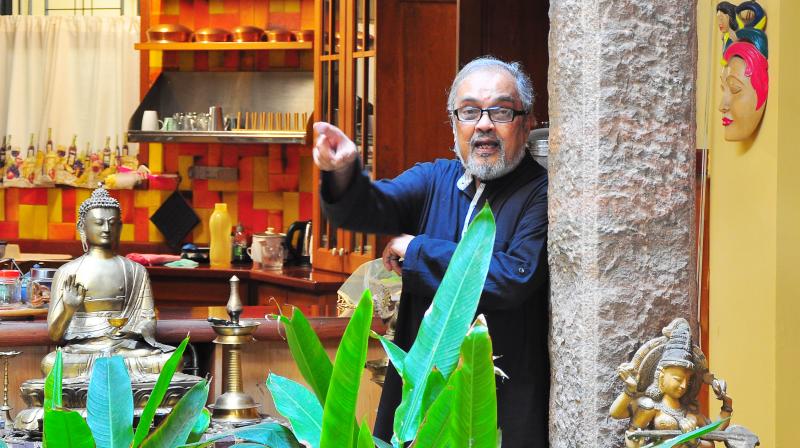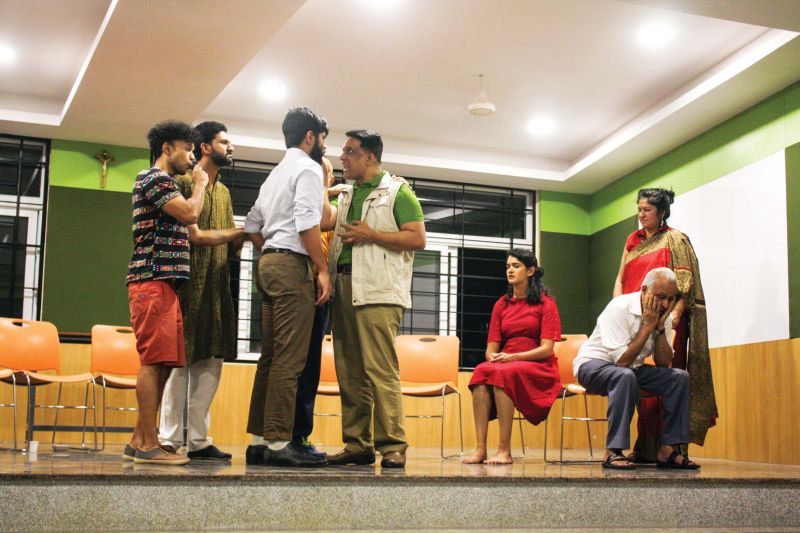Modernity, Identity Wars & Why Should Indians Don't Hug!
To Sen, one of the best-known thespians in the city, Indian writing in English has always been exciting to discover.

"There are two kinds of people in this world. Those who divide people into two kinds and those who don't," laughs G.K. Jayaram, quoting Robert Benchley. A former Chairman of Infosys-turned-philanthropist, Jayaram's return to India also marked a return to his first love: Writing. With an anthology of Kannada poems and How to Help an Elephant Make a U-turn, a book on leadership, Jayaram will make his first foray into theatre with The Costume Party. He and director, Ashish Sen, talk to Darshana Ramdev about the journey.
On November 8, 2016, the world as we knew it changed. A wealth Indian immigrant in the United States throws what he thinks will be a party celebrating the much anticipated victory of Hilary Clinton. A night of celebration turns out to be anything but, when an unexpected visitor, a white man, arrives to pay his respects. "The night of celebration turns out to be anything but," says Ashish Sen, director of The Costume Party. "As the evening wears on and their visitor brings his politics on his sleeve, the masks begin to peel."
 A still from The Costume Party
A still from The Costume Party
Human beings appear to be inherently preoccupied with identity, constantly drawing lines in the sand and creating boxes to better understand our fellow-men and perhaps arrive at a better understanding of ourselves. As Sen puts it, the question the play really asks is, "What is home? Who belongs and who is the outsider?" The people at the party, all wearing their ancestral attire, come from different ethnicity, are part of the new coalitions that are taking place in the hunt for belonging.
To Sen, one of the best-known thespians in the city, Indian writing in English has always been exciting to discover. "It's not just craft that gets you, it's usually an issue or a topicality." The Costume Party is an unpublished play, by a playwright making first forays on the stage. Dr G.K. Jayaram, founder and managing director of the Institute of Leadership and Institutional Development, returned to India in 2011 at the behest of Infosys co-founder Narayana Murthy. Here, he was asked to set up an institute of leadership at the Infosys campus in Mysuru. That brought Jayaram and his family back to India after over three decades, where eventually found his way back to his first love: writing.
"Society is dangerously divided, I want to present that without being boring or didactic," says Jayaram. "We're all nomads, we travel to different places and the We vs Them argument has sharpened so much." The motley group of visitors represent the plethora of communal divides that exist in the United State - a Jew, a black man, a Republican, a South Indian family and an Indian Muslim are engaged in a battle of wits. "The conversation goes very quickly from I belong here to 'you don't belong here. Research says that even infants tend to be drawn to those who look like them, so the matter of identity is inherent to a certain extent."
Leaving the idyllic charm of his hometown in Karnataka and entering corporate life opened up a new world. A self-professed political junkie, Dr Jayaram began debating at the age of 13, which also marked the start of his tryst with English literature. "Nobody read in English where I grew up but we all read in Kannada. It was a very rich source." Back in the day, debates would draw throngs of enthusiastic crowds - "There was no T.V. we depended on the radio for entertainment," he says. "Read voraciously helped me expand my own perspectives." Soon, his parents were forced to put his growing collection of trophies in gunny sacks and push them under the bed, "We lived in a small house, there was no room for them," he says.
This year, incidentally, marks the 50th anniversary of his gold medal at IIM-A. "That changed my life. With my background, I couldn't really afford to study, let alone do so abroad." He won a Ford Foundation scholarship and arrived in California Institute of Technology. In the 1980s, Jayaram joined Infosys as its Chairman and stayed there for four years until he branched off to start his own firm. In 2011, he returned to India when Narayan Murthy sounded his clarion call. "He asked me to set up an institute of leadership at the Infosys campus in Mysuru," he recalls.
Much had changed since. The small-town world he left behind had been replaced with a growing urban culture, one that emphasised the individual over the collective. "We grew up with a certain hierarchy, a certain set of rules that allowed us to coexist. Once a village exceeded a population of about 450, people would automatically cluster elsewhere. If you followed the rules, you lived in peace. That system of values has disintegrated but hasn't been replaced with anything else." One day, the headmistress of a local school burst into their home, saying, in Kannada, "The sky is falling on our heads." The school was one of 10 established by a philanthropist who had just passed away. "His son didn't want to continue and it looked as if the schools would close. 4500 children would have nowhere to go."
By this time, Jayaram had worked with NGOs across the country, creating strategies that would bring corporate expertise and skill sets into the development sector, in a programme they called Pygmalion. He adopted five schools, with their help and reached out to other NGOs to take on one school each. "It's the sixth year and we're still running," he says. Proceeds from the play will go towards maintaining the schools, which costs around Rs 2.75 crore a year. "If this works, it will be another source of revenue for us," he remarks. "I find it unconscionable that we would be shutting down schools when we can afford to open a thousand more. And everyday, looking back, I'm so grateful for the enlightened minds who have always lived in this country. Without their efforts, there would have been no place for children like me."
As the evening of November 8 comes to an end, a slightly discomfited group of friends find common ground, shake hands and hug goodbye." This even gave the play its alternative title, South Indians Don't Hug! "I think the point I'm trying to make here is that our conflicts transcend the immediate cause. It's easy to identify with the people who are like you but it's the differences we need to embrace. There was room for this acceptance in the past because anything else had consequences: Today, everybody is a victim because there is a void where the old values once existed."

